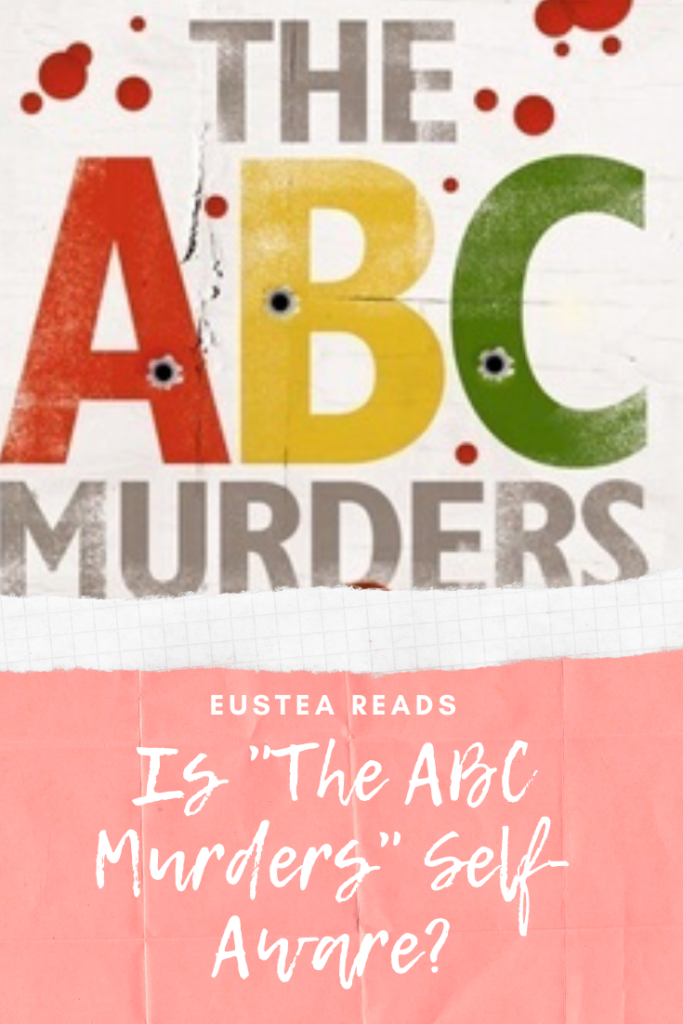In an effort to be ready for the March edition of A Year with Christie 2020 (having completely missed the February version), I checked out The ABC Murders from the library early. Since this is my second time reading the mystery, I sort of knew what was going on and so, instead of guessing what was going to happened, ending up noticing all the small ways the book was self-aware.
Before we begin, a quick plot synopsis: The ABC Murders start when Poirot receives a letter threatening death. It comes to pass, with an ABC guide (train guide) found next to the body. Two more deaths are found in quick succession. Poirot, with Hastings helping him, must work to outwit this canny serial killer and uncover the truth.
Now, Christie definitely doesn’t break the fourth wall and I don’t think that The ABC Murders can be counted as meta-fiction, but there are a lot of fun hints that the book is verging on self-awareness. For example:
- In the forward, Captain Hastings (the purported “author” of the story, very much the Waston to Poirot’s Holmes) makes a mention of how he can “vouch for the occurrences related in these chapters” and specifically mentions that even in the scenes where he wasn’t present, he believes that he was accurate. This heightens the sense of reliability in the text and makes it a novel disguised as true crime.
- Poirot and Hastings have a discussion about crime and many (old) mystery/gothic fiction tropes are mentioned: “curiously twisted daggers, […] blackmail, […] emerald that is the stolen eye of a god, […] untraceable Eastern poisons.”
- “I shouldn’t wonder if you ended by detecting your own death,’ said Japp, laughing heartily. ‘That’s an idea, that is. Ought to be put in a book.'” – foreshadowing Poirot’s actual bookish death
- Poirot teases Japp by pretending to be Sherlock Holmes and being able to deduce the appearance of the murderer from their preliminary investigations (though the name of Holmes isn’t actually mentioned)
These are all small hints, nothing big enough to overtake the mystery in the novel, but enough to make me smile when I come across them. The ABC Murders was written in 1936, fifteen years after Christie’s first novel and six years after the formation of the Detection Club. I wonder if the collaboration on the round-robin books in the club (especially Ask a Policeman, where they write each other’s characters) inspired her to inject a bit of self-awareness into her books. I haven’t done a chronological study of Christie’s books, so perhaps a better Christie fan can weigh in on this?
This was fun to consider. Personally, I think Christie intentionally dropped these hints of self-awareness in the book to make it more enjoyable, especially for readers who love the genre. I also enjoyed reading the mystery, which features a serial killer (pretty rare in her books) and seeing Poirot and Hastings work together to solve this. In the future, I’ll be on the look out for more such hints of self-awareness when reading more Christie novels.
Featured Image: Photo from Canva


I quite like books that are self-aware in those ways! 🙂 The Jackaby series uses a similar technique!
Oooh, I read the first book but didn’t notice this. A sign to read on/reread them!
My favorite parts of Christie books are always the commentary, usually given by Poirot or Miss Marple. It could be about detective story tropes, but I also remember commentary by Poirot about modern young ladies (hilarious!) and by Miss Marple about village life, and above all people’s character …
I agree that not only this, but nearly every Christie rewards at least a second reading. On the first reading, you are a bit confused, experiencing the suspense, and just along for the ride. On the second reading, you notice little thinks like this. I now realize that as a teen, when I first read Christie, I was completely clueless about the British class system and social norms, which made me miss a lot of the story. And yet it was reading Christie, primarily, that gave me an introduction to these things.
Poirot on love can be funny or insightful, in my opnion.
But yes! I think a lot of people assume that Christie’s novels are cozies and therefore “simple”, but she actually wrote a lot of depth into them (especially her best works – they stand up to lots of rereads)!